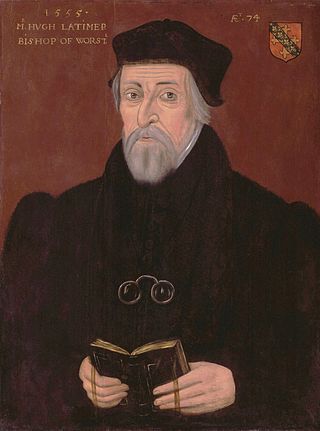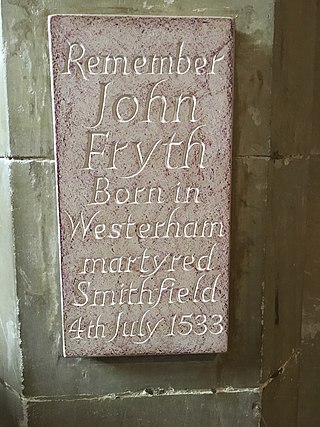Related Research Articles

Edmund Bonner was Bishop of London from 1539 to 1549 and again from 1553 to 1559. Initially an instrumental figure in the schism of Henry VIII from Rome, he was antagonised by the Protestant reforms introduced by the Duke of Somerset and reconciled himself to Catholicism. He became notorious as "Bloody Bonner" for his role in the persecution of heretics under the Catholic government of Mary I of England, and ended his life as a prisoner under Queen Elizabeth I.

Hugh Latimer was a Fellow of Clare College, Cambridge, and Bishop of Worcester during the Reformation, and later Church of England chaplain to King Edward VI. In 1555 under the Catholic Queen Mary I he was burned at the stake, becoming one of the three Oxford Martyrs of Anglicanism.
Edward Foxe was an English churchman, Bishop of Hereford. He played a major role in Henry VIII's divorce from Catherine of Aragon, and he assisted in drafting the Ten Articles of 1536.

Edwin Sandys was an English prelate. He was Anglican Bishop of Worcester (1559–1570), London (1570–1576) and Archbishop of York (1576–1588) during the reign of Elizabeth I of England. He was one of the translators of the Bishops' Bible.

John Frith was an English Protestant priest, writer, and martyr.

Rowland Taylor was an English Protestant martyr during the Marian Persecutions.

John Day was an English Protestant printer. He specialised in printing and distributing Protestant literature and pamphlets, and produced many small-format religious books, such as ABCs, sermons, and translations of psalms. He found fame, however, as the publisher of John Foxe's Actes and Monuments, also known as the Book of Martyrs, the largest and most technologically accomplished book printed in sixteenth-century England.

Robert Ferrar was a Bishop of St David's in Wales. He was prior of Nostell Priory, embraced the English Reformation, and was made Bishop of St. David's by Edward VI. He suffered martyrdom during the Marian persecutions.

Sir Clement Higham MP JP PC of Barrow, Suffolk, was an English lawyer and politician, a Speaker of the House of Commons in 1554, and Chief Baron of the Exchequer in 1558–1559. A loyal Roman Catholic, he held various offices and commissions under Queen Mary, and was knighted in 1555 by King Philip, but withdrew from politics after the succession of Queen Elizabeth I in 1558.

William Bill was Master of St John's College, Cambridge (1547–1551?), Vice-Chancellor of the University of Cambridge (1548) and twice Master of Trinity College, Cambridge, Provost of Eton College (1558–1561) and Dean of Westminster (1560–1561).
Edmund Cosyn (Cosin) was an English Catholic academic and Vice-Chancellor of Cambridge University of the middle sixteenth century.
Walter Haddon LL.D. (1515–1572) was an English civil lawyer, much involved in church and university affairs under Edward VI, Queen Mary, and Elizabeth I. He was a University of Cambridge humanist and reformer, and was highly reputed in his time as a Latinist. He sat as an MP during the reigns of Mary and Elizabeth. His controversial exchange with the Portuguese historian Jerónimo Osório attracted international attention partly on account of the scholarly reputations of the protagonists.
William Graham, 2nd Earl of Montrose was a Scottish nobleman and statesman, who successfully steered a moderate course through the treacherous waters of mid-16th century Scottish politics.
Thomas Wendy was the royal physician to Henry VIII of England, a Member of Parliament and a member of the King's Privy Chamber.
References
- ↑ "FRYER, John (1498/99-1563), of London. – History of Parliament Online". historyofparliamentonline.org.
- 1 2 "Fryer, John (FRR517J)". A Cambridge Alumni Database. University of Cambridge.
- . Dictionary of National Biography . London: Smith, Elder & Co. 1885–1900.
- Attribution
![]() This article incorporates text from a publication now in the public domain : "Fryer, John (d.1563)". Dictionary of National Biography . London: Smith, Elder & Co. 1885–1900.
This article incorporates text from a publication now in the public domain : "Fryer, John (d.1563)". Dictionary of National Biography . London: Smith, Elder & Co. 1885–1900.